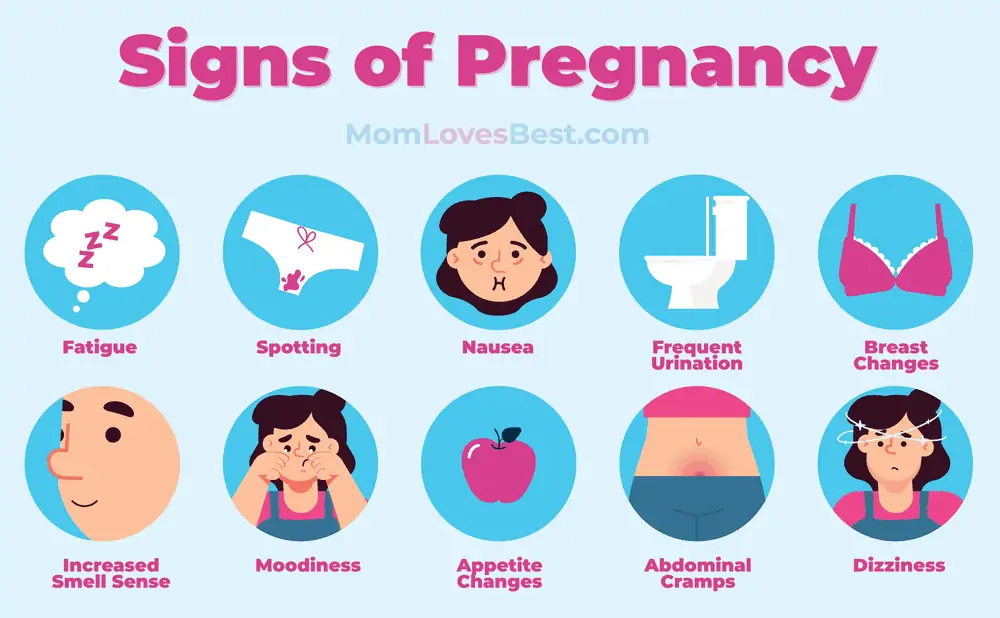You are analyzing every twinge, cramp, and mood swing. Is it a baby, or did you just eat something funny?
Many women notice subtle changes in their bodies a few weeks after ovulation. Classic signs like tiredness, irritability, and stomach cramps are common. Then comes the wait for your period (or lack thereof).
But is it possible to detect pregnancy symptoms in those very early days? Let’s break down the most common DPO (Days Past Ovulation) symptoms in the first two weeks.
Key Takeaways
- Breast tenderness and nipple sensitivity are often the earliest signs of pregnancy, though they can also signal an incoming period.
- Implantation bleeding (light spotting) and cramping can occur between 6 and 12 DPO as the egg attaches to the uterine lining.
- High progesterone levels cause fatigue, bloating, and mood swings starting around 10 DPO.
- A missed period and a positive home pregnancy test are the only ways to confirm conception 100 percent.
Understanding Your Menstrual Cycle
Before we detail specific DPO symptoms, it helps to understand the stages of your menstrual cycle. This complex process prepares your body for pregnancy every single month.
1. The Follicular Phase
The first phase of your cycle is the follicular stage. It begins on day one of your period and ends when you ovulate. This usually covers days one to 13 of an average cycle.
2. Ovulation
Ovulation happens around day 14 of a 28-day cycle. One ovary releases an egg, which travels down the fallopian tube toward the uterus. If it meets viable sperm here, fertilization happens.
3. The Luteal Phase
Days 15 to 28 make up the luteal phase. Your uterine lining thickens to become a soft, spongy environment for a potential baby.
Two things can happen here. A fertilized egg finds a home and embeds itself in the lining during implantation.
Or, if the egg remains unfertilized, hormone levels drop. This triggers your body to shed the uterine lining, and menstruation begins.
Common Symptoms by Days Past Ovulation (DPO)
Now that you understand the cycle, let’s look at what happens between days 14 and 28. This period is famously known as the “Two Week Wait.”
It is not an exact science because every woman is different. However, here are the most common DPO symptoms you might experience after an egg has implanted.
Remember
1. Tender Breasts and Sore Nipples
Do you wake up feeling like your breasts are heavier or more tender than usual? You might find your favorite bra suddenly feels like a torture device.
Breast discomfort is one of the earliest signs of conception. You may experience it as early as 1 or 2 DPO, and it often continues throughout pregnancy (1).
Along with general tenderness, you might notice nipple sensitivity. Even the friction of a t-shirt can feel irritating.
Hormones are the culprit here. Progesterone causes milk glands to swell, leading to soreness. While this also happens during PMS, it is often more exaggerated during early pregnancy.
2. Fatigue
Those same hormones work overtime, making you feel exhausted. Your body is expending massive amounts of energy to build the life-support system for a baby.
Despite sleeping more than usual, you might still feel drained (2).
This “progesterone nap attack” usually hits around 10 DPO. Listen to your body during this time. If you need to sleep at 7 p.m., do it.
3. Implantation Cramps
Tummy cramps are common during a monthly cycle, but pregnancy cramps feel slightly different.
You might feel a mild pressure, pricking, or a quick, sharp pain. This can occur as the egg nestles into the uterine wall, typically between 6 and 10 DPO.
Your womb also grows rapidly during the early stages of pregnancy. This stretching sensation prepares your body to house a baby for the next nine months. If cramping is severe or accompanied by heavy bleeding, see a doctor immediately.
4. Pinching and Pulling Sensations
Distinct from dull cramps, some women describe a “pinching” or “pulling” feeling inside the abdomen.
Imagine a small tug behind your belly button. These sensations are normal and can happen from 6 DPO onwards. While uncomfortable, it should not be painful.
5. Frequent Urination
You won’t need adult diapers just yet, but you might notice you need to pee more often than usual.
HCG (the pregnancy hormone) increases blood flow to your pelvic area and kidneys. Your kidneys become more efficient at filtering waste, meaning your bladder fills up faster (3).
This symptom can start as early as 9 DPO. Unfortunately, it usually sticks around until delivery day.
6. Heightened Sense of Smell
Sudden aversion to your husband’s cologne? Gagging at the smell of brewing coffee? An increased sense of smell is a classic early sign.
This “superpower” can be noticeable from 9 DPO onwards. While useful in the wild for avoiding rotten food, it is less fun when the smell of morning coffee sends you running to the bathroom.
Hormones and increased blood flow generally cause this olfactory overdrive (4).
There is a theory that nausea and vomiting in pregnancy is a protective agent from our hunter-gatherer days. This would keep a woman who doesn’t know she is pregnant yet from eating game that had spoiled or ingesting potentially contaminated food (5).
Editor's Note:
Caitlin Goodwin, MSN, RN, CNM7. Nausea and Sickness
Morning sickness can hit like a freight train. For some lucky women, it never happens; for others, it begins as early as 10 DPO.
Nausea isn’t limited to the morning. It can strike in the afternoon, evening, or last all day.
Heightened progesterone levels slow down your digestion. This sluggishness can increase gas, bloating, and that queasy feeling (6). If you can’t keep fluids down, contact your healthcare provider.
8. Changes in Appetite
One day you are nauseous; the next, you want to eat the entire fridge.
You might find yourself craving foods you usually hate. Common cravings include salty foods like pickles, comfort carbs like pizza, or sweet treats like chocolate.
Researchers believe this may be your body signaling a need for specific nutrients (7). Whatever the cause, sudden hunger spikes often begin around 10 DPO.
9. Basal Body Temperature (BBT) Shift
If you track your fertility, you know your Basal Body Temperature (BBT) spikes after ovulation. Usually, it drops back down right before your period starts.
If you are pregnant, that temperature stays elevated.
A BBT that remains high past the time your period is due is one of the most accurate physical signs of pregnancy. You might also notice a “triphasic” pattern, where the temperature takes a second dip and rise around 7-10 DPO due to implantation.
10. Mood Swings
You are riding a hormonal rollercoaster. You might feel euphoric one minute and filled with rage the next.
Moodiness up to 4 DPO usually signals that your period is coming. However, mood swings that persist past 7 DPO could indicate pregnancy. Your body is flooded with new hormones, and it takes time for your brain to adjust.
11. Weepiness
Similar to mood swings, but distinct enough to mention: you might cry at everything.
Commercials, a sad song, or dropping a spoon could set off the waterworks. This emotional sensitivity is a direct result of hormonal shifts (8). If you feel overwhelmingly sad or anxious, speak to your doctor about prenatal depression.
12. Dizziness
Some women experience dizziness or lightheadedness as early as 5 DPO.
This happens because your blood vessels dilate (widen) to increase blood flow to the uterus, causing a temporary drop in blood pressure. Low blood sugar from not eating enough can also contribute.
13. Cervical Mucus Changes
After ovulation, your cervical mucus usually dries up. If you are pregnant, you might notice an increase in creamy, white discharge.
This is called leukorrhea. It helps protect the birth canal from infection. If you notice an abundance of lotion-like discharge around the time your period is due, it is a positive sign.
14. Spotting (Implantation Bleeding)
A small amount of light pink or brown spotting can happen between 6 and 12 DPO (9).
This is implantation bleeding. It occurs when the fertilized egg burrows into the rich lining of the uterus. It usually lasts only a few hours to a couple of days and is much lighter than a period.
15. Metallic Taste
Some women experience a condition called dysgeusia. This manifests as a sour or metallic taste in the mouth that won’t go away, even after brushing your teeth.
It feels like you have been sucking on old coins. This strange symptom is caused by the surge of estrogen and usually fades after the first trimester.
FAQs
The Bottom Line on DPO Symptoms
There are dozens of symptoms you might feel in the days after ovulation. From metallic tastes to mood swings, your body goes through a lot of changes very quickly.
However, there is only one sure way to know if you are pregnant: take a test.
Every woman is different. You might have every symptom on this list, or you might have none at all and still be pregnant. If you are stressed about the symptoms, wait until the first day of your missed period and pee on a stick. It is the only way to know for sure.








